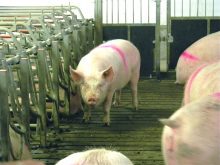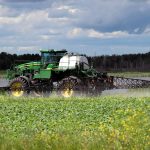A new development fund sponsored by organic food companies will soon support associations in Manitoba, Saskatchewan and Alberta trying to expand the number of organic farmers.
The Prairie Organic Development Fund (PODF) is a multi-year fund that organic food companies have pledged to support, while the Prairie Organic Grain Initiative (POGI) will be its first funded project, said Becky Lipton, a PODF interim board member.
Now in final stages of incorporation, the fund has attracted wide support from organic food companies that are looking to stabilize and expand grain production in Western Canada.
Read Also

Farmer-friendly nematodes: Tiny worms for big canola pest control
Not all nematodes are equal in farm fields. Beneficial species of the tiny soil-dwelling worms could one day help beat back damaging canola insect pests like diamondback moth on the Canadian Prairies.
Demand for organic grains is outstripping supply as few organic farmers are entering the sector and more have exited.
It’s resulting in wide-ranging uncertainty about the future of the Canadian-grown supply, so organic end-users have approached producer associations saying, ‘we need you to be stronger,’ said Lipton who is also executive director of the provincial association Organic Alberta.
“They turned to us and said, ‘we see the organic associations in each of the provinces, Manitoba, Alberta, Saskatchewan as playing a significant role in helping us maintain the continued growth in the organic sector… and we’re prepared to resource you.”
Companies have agreed to contribute, based on a percentage of their sales, to a fund to be administered by Organic Alberta, and overseen by an elected board of directors, that will include representatives from all three provincial associations including Organic Alberta, SaskOrganics and the Manitoba Organic Alliance.
The fund provides a source of sustainable funding that organic’s multi-commodity sector needs, but never could tap through any sort of checkoff program, Lipton said.
“The companies involved see this as an investment not only in the longevity of their company but the entire sector,” she added. “We see tremendous growth in this fund in the future.”
The first initiative to be funded through PODF is called the Prairie Organic Grain Initiative, or POGI. It’s main aim is to increase the quantity and quality of organic field crop production on the Prairies, Lipton said.
“We really need work done in this area.”
The PODF put a large portion of its funds into this initiative, which makes support available to groups that apply, Lipton said. The three main focuses include encouraging more farmers to make the switch to organic production, supporting existing organic grain growers by linking them to new markets and financing new research. The goal is to demystify the organic transition process for conventional growers, and get out word about the emerging opportunities in organics, Lipton said.
“Organic prices are quite high at the moment, but there is also that larger story that we have long-term proven demand, and this is a long-term stable sector,” she said.
“We’re working to make it more so.”
At last count, Manitoba has just 136 organic farmers down from a peak of 250 before the 2008 recession hit. A further exodus has occurred since conventionally grown commodity prices began to spike.
“We’ve probably lost 40 per cent of producers,” said Laura Telford, provincial organic specialist for Manitoba.
Yet, farmers are remaining interested in organic production. There were about 100 at an Ag Days workshop about making the switch.
Probably about half were conventional growers doing “a little tire kicking” and that’s a good sign, Telford said.
“Out of that, some smaller number of them will actually sign up and start transitioning,” she added. “But we haven’t seen that in four or five years.”




















